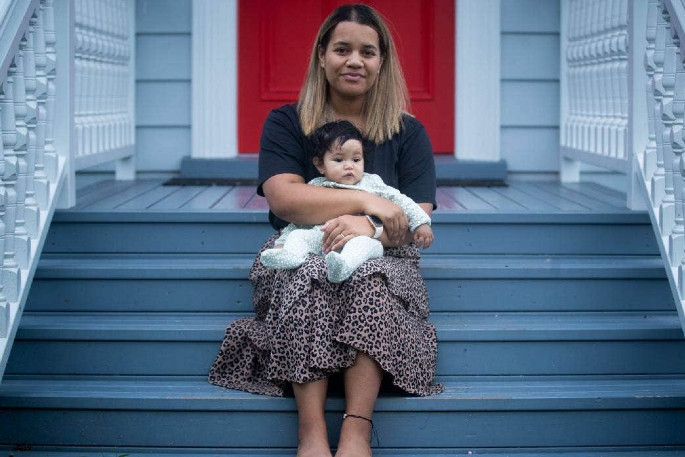Laying in a hospital bed in an air-sealed isolation room, lungs filled with fluid caused by pneumonia from Covid-19, Ruthie Nielsen prayed for her unborn baby.
In September, the Auckland woman contracted Covid-19 after attending a tangi and spent 34 days at the Jet Park quarantine facility.
The 31-year-old is speaking out as part of a campaign to remind people Covid-19 'is real, it's hard – and there is a way you can be safeguarded against that”.
After Ruthie attended a 100-person tangi, people started getting sick and urged each other to get tested.
Ruthie (Ngapuhi) went with her husband Hans to a local testing centre to support him.
She wasn't going to get tested, as he had been around the whānau more than she had, but she decided to get swabbed while in the car.
The texts to say people tested negative started rolling in to Nielsen's family members that same night, but hers didn't come.
Sitting around the dinner table, her phone lit up with a call from the public health service – a number she knew well, given her work in Maori public health, in the tobacco advocacy team at Hapai te Hauora.
'I knew straight away it was them calling.”
Shock set in looking at her kids, then aged 4 and 1, running around the house, as she thought: 'Oh gosh, they've been exposed”.
For the first few days, she'd had no symptoms other than tiredness – which she'd put down to being heavily pregnant.
Then the 'non-stop hot-and-cold sweats” struck.
Ruthie was rushed to south Auckland's Middlemore Hospital twice due to Covid, first when the baby stopped moving – and there was no equipment to help her at Jet Park – and later for a seven-day stint when she developed penumonia.
Ruthie racked up 34 days at Jet Park, as the 14-day clock reset each time another member of their bubble tested positive.
On day 34, Ruthie's niece, who lives with her, returned home having tested negative during her time at Jet Park, only to test positive.
They were permitted to do a further 14 days' isolation at their Kelston home, under the close eye of security. All made a full recovery, but it was a hard road.
On Sunday, Te Puni Kokiri (the Ministry of Maori Development), in collaboration with the Health Promotion Agency, Ministry of Health and Unite Against Covid-19, is launching a national Maori communications campaign to support the vaccine roll-out.
‘Karawhiua' – which means 'Give it heaps! Go for it!” – uses stories from Maori impacted by Covid-19, including Nielsen, in a bid to motivate more than 500,000 Maori to get vaccinated this year.
Research conducted by the Ministry of Health in February showed 41 per cent of Maori needed more information on the vaccine, and 30 per cent did not understand the vaccine would be free.
Surveys consistently show Maori are less likely to get the Covid-19 vaccine than non-Maori.
Ruthie says she understood there was trepidation and fear about the vaccine, but was sharing her story 'in the hope no-one else ever has to go through what we went through”.
The launch of the campaign coincides with Mother's Day, which holds a special significance for Nielsen this year.
Her daughter Hope, now six months old, was born happy and healthy after a 'tumultuous time”.
She was named for the fact 'we really had no hope at the time”.
Meanwhile, the pause on quarantine-free travel between New Zealand and New South Wales will be lifted on Sunday night.
But Covid-19 Response Minister Chris Hipkins says the resumption of flights with Sydney will be subject to there being no significant further issues across the ditch.
It comes as an Australian epidemiologist is warning a Covid outbreak is "absolutely inevitable" in the country.
The risk of a disastrous outbreak in Australia is at its highest level since the pandemic began, James McCaw, an epidemiologist and mathematical biologist with the University of Melbourne, says.
As the virus continues to rip through India, Kiwi cricketers fleeing the country after the Indian Premier League was suspended have landed in Auckland.
The group of cricketers went into managed isolation and a second flight was expected to leave India on Saturday night.
An Auckland-based biotech company is to start trials for a Covid-19 test expected to be ten times cheaper than traditional methods.
Global toll
The global number of Covid cases has reached 157.1 million, according to John Hopkins University. Global deaths have now surpassed 3.27 million.
The United States continues to report the highest number of infections in the world - 32.7 million - followed by India with 21.9 million.
Two southern states in India have become the latest to declare lockdowns, as coronavirus cases surge at breakneck speed across the country and pressure mounts on the government to implement a nationwide shutdown.
India has recorded almost 22 million cases of the virus. On Saturday, its daily death toll surpassed 4000 for the first time - but it's thought the true scale of the crisis may be much worse.
What should I do?
Anyone who wants to get tested can find their local testing centres by visiting the Ministry of Health website.
If you are sick, call your GP before you visit, or Healthline on 0800 358 5453.
To avoid contracting and spreading the virus, wash your hands properly, cough and sneeze into the crook of your elbow and throw tissues away immediately.
Reach out, find support from people who care, connect with your community or help a neighbour in need.



0 comments
Leave a Comment
You must be logged in to make a comment.